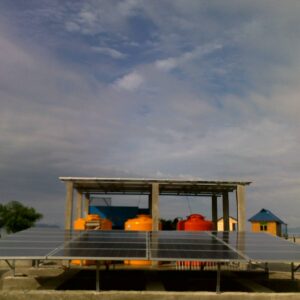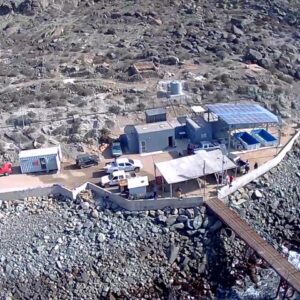In many Asian areas, saline ground water and salt water intrusion cause constant difficulties for the local communities. In this context, AqSep has supplied a large number of ESTATE WATERMAKER units to Asian contractors for installation in small communities in remote coastal areas.
The units are government-funded and ensure high-quality potable water for around 2-3,000 people per desalination unit. With about 400 units, nearly one million Asians obtain their water from AqSep desalination units.
Thanks to AqSep’s reverse osmosis technology, saline water is no longer a problem. Even in those areas where seawater is the only source, the desalination units are able to produce potable water without difficulties. Many of the units are additionally powered by solar cells which constitutes a more environmentally friendly power solution to water supply.

FRESH WATER FOR FISHING COVES
Chile has a long coast line with arid climate in many places. A great part of the population living in small, remote fishing coves suffers from freshwater scarcity, and this part of the population is therefore often left to rely on trucked water of inadequate quality.
A number of such coves are now assisted by the Undersecretariat for Fisheries and Aquaculture through the government’s social agenda in favour of the artisan sector. More specifically, this concerns coves in five regions of the country most of which are located in the north of Chile and face water shortages.
AqSep has supplied a large number of ESTATE WATERMAKER and RESORT WATERMAKER units to areas in Chile between 2017 and 2020. All installations benefit from the novel design with integrated energy recovery. The low energy consumption forms the basis for a sustainable water treatment plant that is powered by solar cells with battery storage. Alternately, the water treatment plant takes seawater and filters it before it is desalinated and placed in storage tanks. For consumption, the water is then chlorinated as is required in Chile. As the desalination plant relies on solar power, it typically only runs during daytime. However, the plant still has a great output as it is capable of producing minimum 4,000 liters of fresh water per day.
All AqSep installations are conducted by a local partner who is thoroughly trained to install and service the turnkey solution.
During the inauguration of one of the installations, people from the local communities expressed great satisfaction and gratitude with the installation of desalination plants. This appears from the following statements:
“Access to water is not only an element of economic development in these coves; at the end of the day, it is a matter of dignity for people.”
– Román Zalaya, Under Secretary of Fisheries and Aquaculture.
“Life. That is the first word that comes to my mind. This plant is a dream. We have strived to achieve this. There were many years of hardship. From relying on a truck that sometimes came and brought jerry cans of water to be able to drink, cook, bathe, clean … We are happy!”
– Teresa Nilo, Head of the cove, La Reina.
Source: http://www.subpesca.cl/portal/617/w3-article-107124.html


